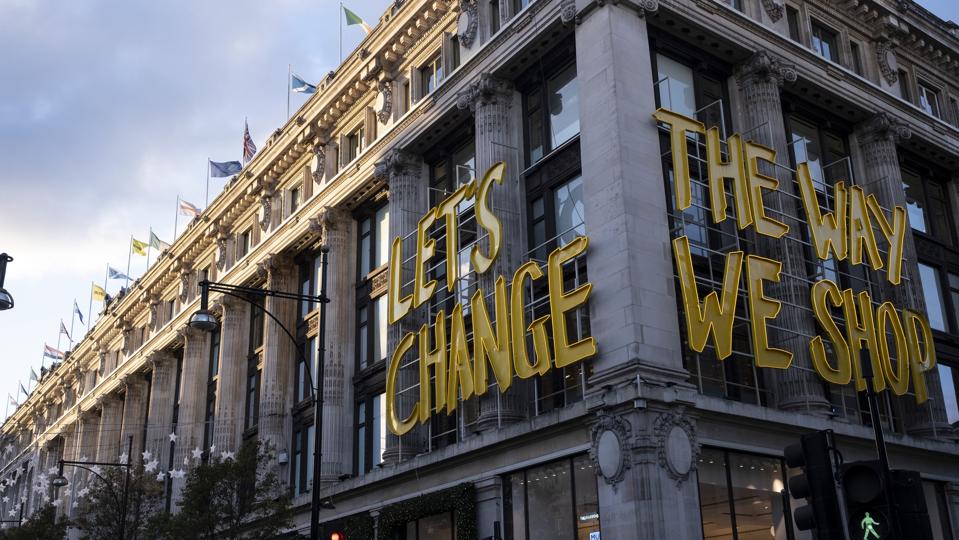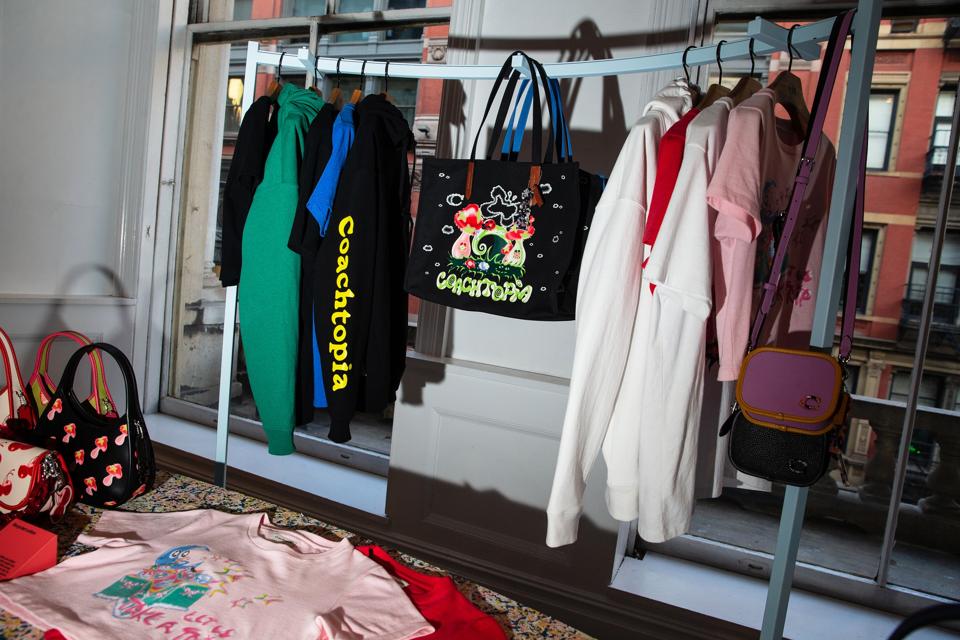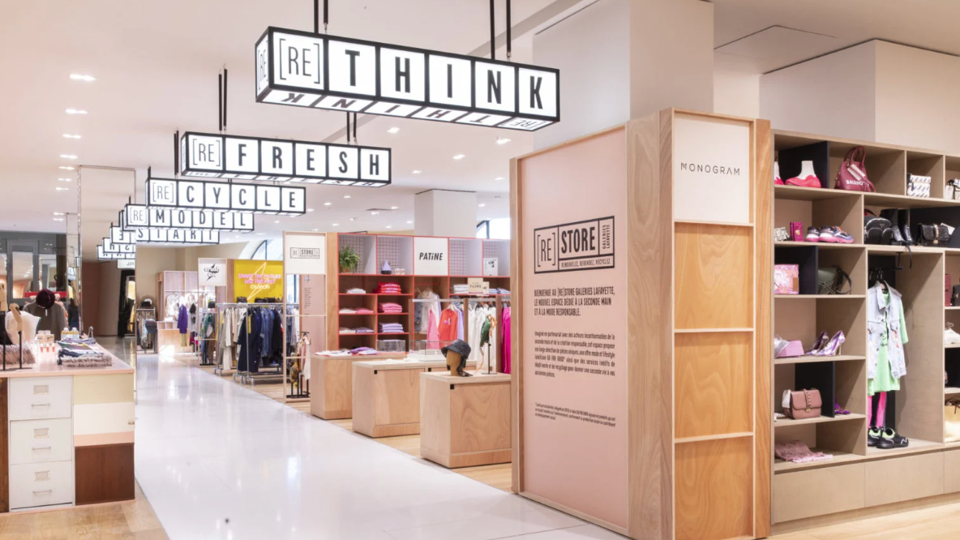With shoppers becoming increasingly mindful of their consumption choices, businesses are facing heightened scrutiny and pressure to meet new sustainability standards and adapt to evolving shopping habits. This is driving retailers to rethink their business models to make circularity part of their mindset and operations. So, how are retailers that weren’t born with sustainability at the core of their business concretely adapting to the circular momentum?
From Linear To Circular Business Models
Certain brands and retailers are paving the way for impactful mindset and operational shifts needed to truly put sustainability at the heart of their agenda. Luxury department store Selfridges developed a vision to reinvent retail through its ‘Project Earth’ initiative, built on three pillars: transitioning to sustainable materials, investing in new shopping models, and challenging the mindsets of its partners, teams and customers. In addition to aiming for net-zero carbon emissions by 2040, the retailer made a bold commitment: by 2030, 45% of transactions within the business will come from circular products and services.
Selfridges considers a transaction to be circular when it comes from a resale, rental, refill, repair or recycled product. This target is backed by continuous efforts and initiatives designed to accompany this ambitious strategic objective, such as the definition of specific targets to deliver a material transformation roadmap, new repair and rental services and in-store experiences to shift customer attitude towards circular shopping and consumption.
Rethinking The Product Life Cycle To Develop A Closed-loop System
Fashion brand Coach has also recently demonstrated its intent to take the circular momentum seriously through the launch of Coachtopia. Developed as a collaborative lab for innovation focused on circular craft, the launch marks a significant milestone for the company. Speaking to FashionNetwork.com at the label’s Regent Street flagship, Joon Silverstein, Coach’s SVP of Global Marketing and Sustainability and Head of Coachtopia, considers that this line is “rethinking the product life cycle from end to end. Creating beautiful new things from waste, designing to re-make at scale and ultimately working towards a closed loop system.” This approach is focused on producing items designed to have multiple lives, implying that they are created with the intent to be easily disassembled and repurposed into another product in the future.
In addition to embracing an innovative approach to designing products made from waste and meant to be recycled and repurposed, Coachtopia leveraged insights from a beta community of GenZ individuals to inspire and be inspired by a demographic that is more actively invested in climate change and the environment. “We believe very strongly that it’s important to create it not for these consumers but with them,” Silverstein told FashionNetwork.com, allowing this initiative to give a voice and platform to creatives and climate advocates excited to participate in disrupting fashion for the better.
The sub-brand offers a line of bags, wallets and ready-to-wear items that are available in Selfridges, Coach stores across North America and the brand’s US and UK sites.
In-Store Resale Offering Is Expanding
The second-hand apparel market is experiencing continuous growth, with sales expected to reach $350 billion by 2037 based on a report from resale platform thredUp. In the United States, 1 in 3 apparel items bought by women in 2022 was second-hand, with Millenials and GenZ responsible for more than half of the revenue. As a response to this growing demand, a number of retailers are designing in-store spaces dedicated to second-hand shopping through the launch of pop-ups, corners and own-brand initiatives.
(RE)STORE space in Galeries Lafayette Haussmann
Galeries Lafayette
In Paris, leading department stores have all started to welcome circularity through dedicated store spaces and offerings. For instance, the Galeries Lafayette Haussmann launched in 2021 a (RE)STORE space of 500 square meters dedicated to second-hand players and sustainable brands. In addition to hosting Monogram, a French luxury second-hand e-tailer, the space features a number of popular online resale shops as well as sustainable brands designing clothing or products made exclusively from offcuts and recycled materials.
Brands with a large retail footprint are evolving to embed circularity in their commercial model. For example, French baby and children’s clothing brand Petit Bateau is making space in its stores for second-hand clothing with the launch of its resale program, allowing customers to both purchase or sell second-hand items in-store. So far, around 20 stores in France are participating in the initiative, with a roll-out to other European countries and Japan expected in the next year. Petit Bateau aims to be the most durable brand in this segment, with products designed to be re-worn by multiple kids, thus almost naturally expected to embrace circularity. While today, only 1% of products sold come from this program, the brand’s CEO Guillaume Darrousez shared on French TV channel BFMTV that by 2030, 1 in 3 transactions will come from the circular economy, either through second-hand or rental products.
Adopting Circularity Is Key To Customer Acquisition And Retention
As of today, retailers are for the most part engaging in the circular momentum as a means to acquire and retain shoppers, rather than to grow profits. In fact, most brands launching their resale platform via a dedicated website struggle to make it a profitable endeavour. Luxury resale platform The RealReal has yet to find an attractive economic model, reporting a net loss of $196 million in 2022 and the closure of various retail locations, which highlights the sector’s struggle to make second-hand retail a scalable and profitable business.
However, while retailers might not drive significant revenue from recycle, repair or resale initiatives just yet, these allow them to attract a new audience: as mentioned in thredUp’s 2023 resale report, 60% of the resale market’s growth will be attributed to new shoppers, stressing the rising interest for second-hand offerings. Considering the expected size of the resale market and growing pressure on brands to become more accountable and conscious of climate change, retailers are expected to get on board and adopt circularity on a bigger scale in the next five years.
By then, we might have the answer to the following question: will circularity – whether through recycling and reusing materials to produce new items or launching an in-house resale program – ever be scalable and profitable? Or will it just represent a fraction of brands’ industrial and commercial operations while enabling them to showcase sustainable commitments?
This article was written by Clara Ludmir from Forbes and was legally licensed through the DiveMarketplace by Industry Dive. Please direct all licensing questions to [email protected].
![]()




